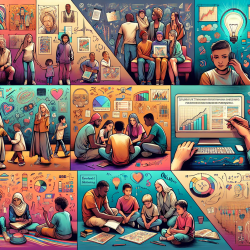Understanding Resilience in African American Men
The research article titled "When Resilience Becomes Risk: A Latent Class Analysis of Psychosocial Resources and Allostatic Load Among African American Men" provides critical insights into the psychosocial resources that influence resilience and health outcomes among African American men. This study, conducted with 283 African American men from the Nashville Stress and Health Study, uses latent class analysis (LCA) to identify distinct resilience profiles and their impact on allostatic load (AL), a measure of physiological stress.
Key Findings and Implications
The study identifies four distinct classes of psychosocial resources among African American men:
- Class 1: High resources across the board except for religious coping.
- Class 2: High coping resources but low control.
- Class 3: Low resources overall but high racial identity.
- Class 4: Low resources but high mastery.
Interestingly, the study finds that the "quality" rather than the "quantity" of psychosocial resources matters for physical health. Classes 1 and 4, despite having different resource levels, both exhibit lower AL scores, indicating better health outcomes. This suggests that specific combinations of resources can significantly influence resilience and health.
Practical Applications for Practitioners
For practitioners working with African American men, these findings underscore the importance of tailoring interventions to enhance specific psychosocial resources. Here are some actionable strategies:
- Focus on Mastery: Encourage the development of a sense of control and mastery in clients, as this resource is linked to lower AL and better health outcomes.
- Enhance Social Support: Facilitate the building of strong social networks, which can provide emotional and instrumental support during stressful times.
- Promote Racial Identity: Support clients in exploring and affirming their racial identity, which can serve as a protective factor against stress.
By understanding and leveraging these psychosocial resources, practitioners can help African American men build resilience and improve their health outcomes.
Encouraging Further Research
This study highlights the need for further research into the complex interplay of psychosocial resources and health outcomes. Practitioners are encouraged to explore these dynamics in their work and contribute to the growing body of knowledge on resilience in African American men.
To read the original research paper, please follow this link: When Resilience Becomes Risk: A Latent Class Analysis of Psychosocial Resources and Allostatic Load Among African American Men.










